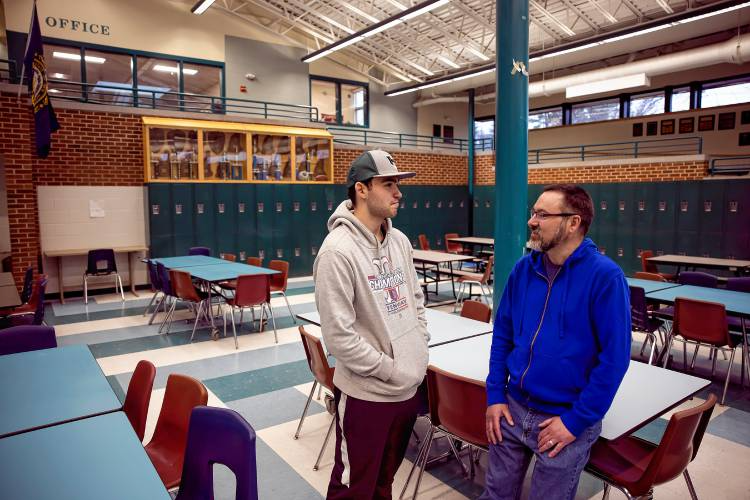In doing their part to capitalize on a season of change – both in the air and otherwise – Turning Point USA’s University of New Hampshire branch held its first ever Fall Festival of Freedom on Friday, Oct. 26, encouraging students to interact with local farm animals and create civil conversation over communal agricultural issues.
The event, which ran from 1 p.m. to 5 p.m. in the “Fishbowl” lawn across from Thompson Hall, offered free apple cider and Halloween candy, as well as a chance to discuss with members of the community, per WildcatLink, “the benefits of free markets, and the negative impacts federal regulations and corporate farms have on local, family owned farming businesses.”
The festival’s highlight for many showcased a small fenced-in area holding three Holstein calves, ranging in age from three to 10 weeks old, overseen by Turning Point members that visitors could pet and get pictures with. One of the volunteers overseeing the exhibit was Jesse Rosencrantz, an executive member of Turning Point who serves as the group’s Outreach Coordinator and has experience in local farming matters.

“I used to work at a local dairy farm [since age 14 at Whippoorwill Dairy Farm in Kensington, NH], and this event is supposed to represent local businesses and how people can support them with their dollars,” Rosencrantz said, “and that’s actually a large part of how small farms are still running today; it’s people from the community recognizing their part in taking part in it by keeping them in business.”
Part of Rosencrantz’s job at the festival involved leading discourse on the importance of locally-sourced agriculture, its impacts on the community, and how residents can support them through, for example, buying products from the farm directly. He also stressed that the presence of the three calves at the event was the result of efforts and contributions from local farmers.
“For me, local farms are dying, and I think people are the answer,” Rosencrantz explained. “The way it works is [with a] bigger economy of scale, you can buy more cheaper; so to keep small farms around, it really is the people in the community keeping them alive, so that’s my big thing.”
Turning Point’s External Chair Bradford Wilbur, a junior political science major at UNH, told The New Hampshire that the main goal of the festival, aside from advertising the benefits of capitalism compared to socialist-driven societies, was to encourage student recruitment and stir up interest in the organization and its events like the Fall Festival of Freedom, adding that the group is “always” looking for new ways to enlist new members.
“So we are trying to spread the idea that socialism is bad; we believe in capitalism, we think capitalism is the way that the country should be run,” Wilbur said, “and whether kids disagree with that or don’t really know about it, we try to get the word out; we have pamphlets, we have stickers and pens. People like it.”
In his defense of capitalism, Wilbur turned to history and present day to showcase countries he sees as monetarily disadvantaged by socialism-driven societies – such as Venezuela, Cuba and Russia, among others – adding that he does not want the United States to follow the advice of late Soviet head of government Vladimir Lenin by embracing communism, which the ruler symbolically called the “goal” of socialism. The ardent defense of capitalistic societies was also made clear by a variety of signs flanking the fence containing the calves, containing messages such as “Big Government Scares,” “Socialism Sucks” and “Crony Capitalism is Phony Capitalism.”
In spite of such messages, however, Rosencrantz insisted that Turning Point, in the bigger picture is less of a political association than it is an advocacy group favoring capitalism regardless of personal partisan leanings, especially in a time of deep political divisions and general distrust in governing bodies.
“There’s a lot of socialism which, obviously being a member of Turning Point, I don’t think it’s a good direction for our country, so that worries me,” he said. “But I think the problem is that, with the election, people aren’t realizing there’s a lot of people on both sides [of the political spectrum] that aren’t those extremes…I come from a family that’s not Republicans, and they’re not ‘crazy right-wing extremists’ and I know that they love and care for people. It’s a passion of mine to say, ‘they think differently than you because of the way they were raised or the way they view things,’ not because they’re stupid, not because they’re evil…and we can all get there together; we can figure it out.”
In spite of darker undertones, the festival itself, held on a sunny Friday afternoon, drew positive reviews from student visitors.
“I saw on people’s’ Snapchat stories that there were cows, so I came through to see what’s up,” sophomore business major James Cautley said about his time at the event. “I mean, you can’t really turn down cows in Halloween costumes.” Cautley added that he had never heard of Turning Point USA prior to the event, but was glad that the group’s messages were being “shoved down my throat” or forced upon him.
First-year chemistry major Gillian Martin – also a member of Turning Point who volunteered a sign stating “Mooove Back Socialism” – said that her personal highlight of her time there was, aside from petting the cows, was the civil discourse she witnessed between students and Turning Point volunteers, adding that she did not witness any out-right protests or opposition to the event.
“It’s just kind of a way to get the word around,” Martin said, “because as much as this event is promoting Turning Point and our political ideals, it’s also promoting helping out local farms…it all starts with opening conversation with people, because if we don’t talk to each other, we are never going to help make any change.”
Follow Us on Twitter
Turning Point USA Holds Fall Festival
November 1, 2018
Leave a Comment
More to Discover
























